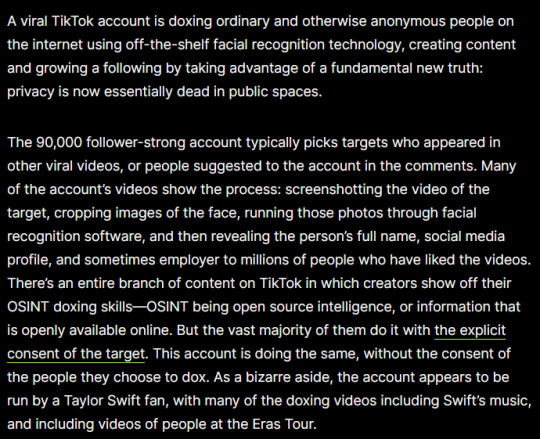#surveillance industry
Text
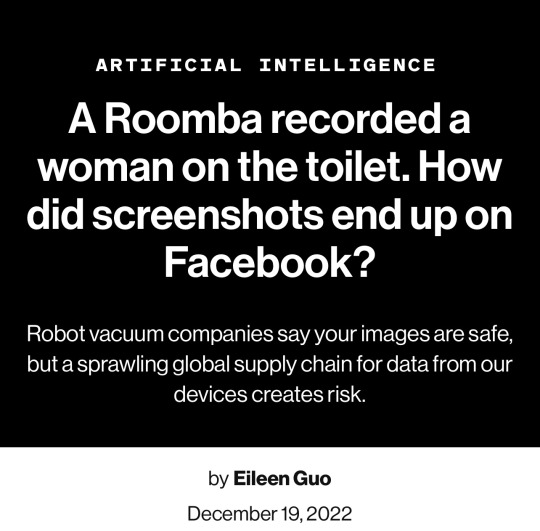
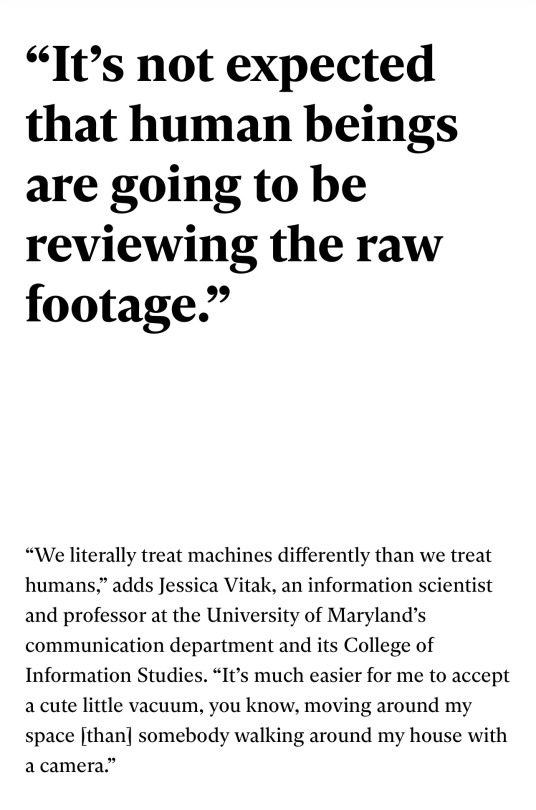


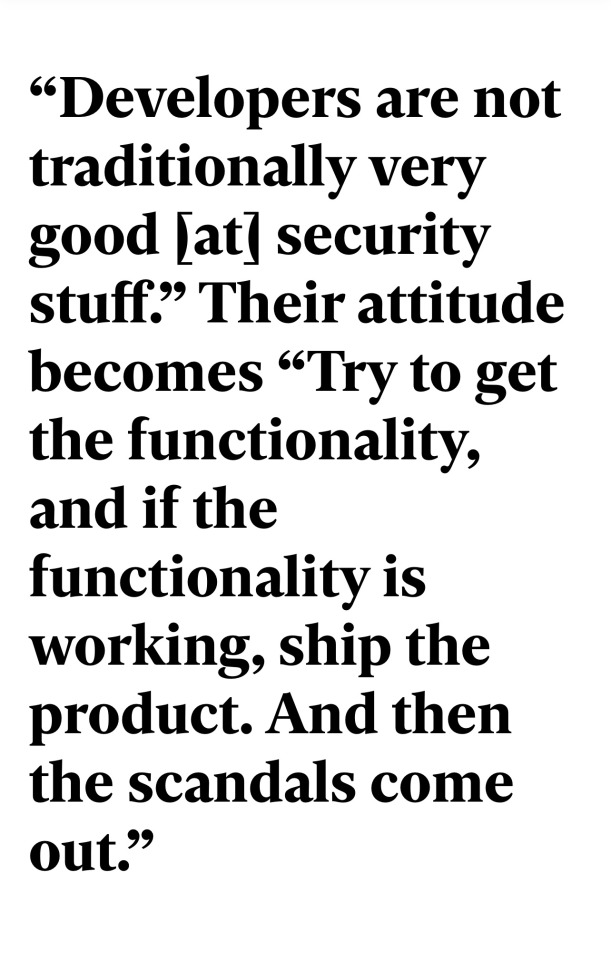
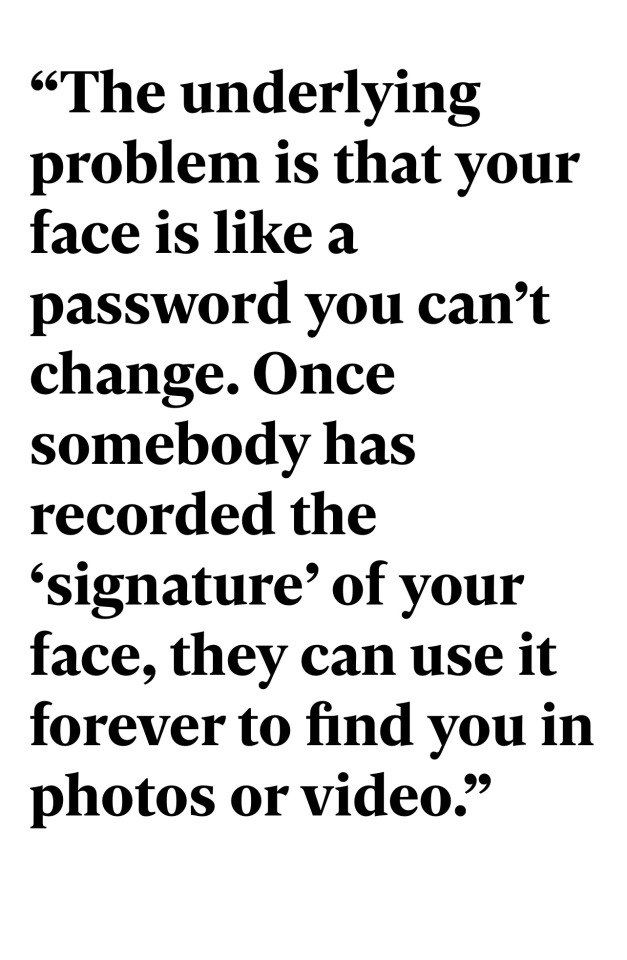
IN THE FALL OF 2020, GIG WORKERS IN VENEZUELA POSTED A SERIES OF images to online forums where they gathered to talk shop. The photos were mundane, if sometimes intimate, household scenes captured from low angles—including some you really wouldn’t want shared on the Internet.
In one particularly revealing shot, a young woman in a lavender T-shirt sits on the toilet, her shorts pulled down to mid-thigh.
The images were not taken by a person, but by development versions of iRobot’s Roomba J7 series robot vacuum. They were then sent to Scale AI, a startup that contracts workers around the world to label audio, photo, and video data used to train artificial intelligence.
They were the sorts of scenes that internet-connected devices regularly capture and send back to the cloud—though usually with stricter storage and access controls. Yet earlier this year, MIT Technology Review obtained 15 screenshots of these private photos, which had been posted to closed social media groups.
The photos vary in type and in sensitivity. The most intimate image we saw was the series of video stills featuring the young woman on the toilet, her face blocked in the lead image but unobscured in the grainy scroll of shots below. In another image, a boy who appears to be eight or nine years old, and whose face is clearly visible, is sprawled on his stomach across a hallway floor. A triangular flop of hair spills across his forehead as he stares, with apparent amusement, at the object recording him from just below eye level.

iRobot—the world’s largest vendor of robotic vacuums, which Amazon recently acquired for $1.7 billion in a pending deal—confirmed that these images were captured by its Roombas in 2020.
Ultimately, though, this set of images represents something bigger than any one individual company’s actions. They speak to the widespread, and growing, practice of sharing potentially sensitive data to train algorithms, as well as the surprising, globe-spanning journey that a single image can take—in this case, from homes in North America, Europe, and Asia to the servers of Massachusetts-based iRobot, from there to San Francisco–based Scale AI, and finally to Scale’s contracted data workers around the world (including, in this instance, Venezuelan gig workers who posted the images to private groups on Facebook, Discord, and elsewhere).
Together, the images reveal a whole data supply chain—and new points where personal information could leak out—that few consumers are even aware of.
(continue reading)
#politics#james baussmann#scale ai#irobot#amazon#roomba#privacy rights#colin angle#privacy#data mining#surveillance state#mass surveillance#surveillance industry#1st amendment#first amendment#1st amendment rights#first amendment rights#ai#artificial intelligence#iot#internet of things
5K notes
·
View notes
Text
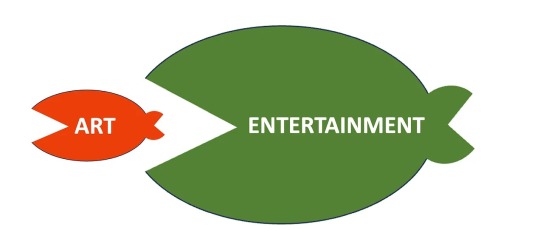

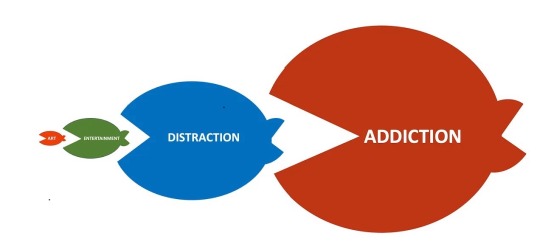
post-entertainment society
#social media#behavioral addiction#attention economy#mental health#surveillance industry#not a perfect article but I love these fishes
205 notes
·
View notes
Text
It’s difficult to talk about technology without also addressing cybersecurity – the two are closely linked since a majority of devices, systems and solutions that people use as part of their personal and business lives are network connected devices.
0 notes
Text






Bebe Neuwirth as Avis DeVoto in episode 2x07 of Julia, "Shrimp and Grits"
#bebe neuwirth#avis devoto#julia hbo#julia#edit:bebeneuwirth#edit:julia#edit:avisdevoto#*#`#i dearly love looking at this beautiful woman's face#especially as i take breaks from reading about the ubiquity of postfeminist approaches to successful ageing in celebrity culture#as something to be 'managed' so that the body must be constantly surveilled for fear of deviating from#narrow conceptions of normative feminine beauty defined by youthfulness#raise a glass to every woman in the entertainment industry not dyeing her hair‚ going under the knife‚ or being injected with botox#and pour one out for every woman in the entertainment industry who is in an effort to make the most out of an impossible situation that#would limit her financial mobility and career opportunities if she didn't fall into line!#hear‚ hear#i will say though that i think as many women who can afford not to undergo cosmetic surgery as a 'solution' to aging shouldn't#because those who have prestigious enough careers (think meryl streep) can continue to land rolls anyway#and i think more women could leverage their success without resorting to such means#rant over i guess
65 notes
·
View notes
Link
By Alan MacLeod
Since Elon has now bought Twitter I think it is important to highlight how he is not some radical outsider, but a crucial part of the US surveillance and national security states. Read my investigation here.
#Elon Musk#Twitter#military-industrial complex#surveillance#imperialism#Pentagon#social media#white supremacy#SpaceX#CIA
346 notes
·
View notes
Text

CLOSED CIRCUIT | CD, 1994
ELECTRONIC EYE (RICHARD H. KIRK)
14 notes
·
View notes
Text
Industrial methods of worker control were prefigured on plantations, which sought to maximize the labor of enslaved Black people otherwise unmotivated to produce value for those who kept them captive. While the relationship between industrial and plantation worker control is foundational, it is essential to recognize that there is no easy equivalence between the terror-enforced racialized labor regimes of plantation slavery, and industrial labor processes that drew on technologies developed on plantations.5 Plantation management—and the relations of domination that structured the plantation—was anchored in a view of Black people as commodities, as something-not-quite-human. And the conditions of bondage on the plantation defined the category of “unfreedom” against which white workers could be classified as “free.”
...
In Dark Matters: On the Surveillance of Blackness, Simone Browne demonstrates that power over enslaved people was executed through bureaucratic technologies that divided enslaved workers, prescribed their routines and motions, and calibrated their movements with the goal of managing and controlling “every moment of enslaved life.”11 Her work clarifies the interplay between the strict division and quantification of life and labor on plantations, and how such segmentation served to make enslaved people observable to overseers and managers.12 The fragmentation of production, whether in the field or the factory, shifts power away from those doing the work to owners who benefit from defining and overseeing a coherent view of workers and the labor process. Such a view doesn’t emerge on its own. Rather, it is produced through records, metrics, and standardized assessments—and we must understand the term “record keeping” to be a synonym for “surveillance.” Monitoring and quantification of work and workers was the first, and arguably most important, step in populating plantation records. And these records’ demands for data and information in turn shaped how labor was divided and managed, in service of making work and workers as visible and quantifiable as possible.
...
Iskander illuminates how designations of skill—and the power that capital claims to define what is and is not “skilled”—work to produce and naturalize conditions of bondage, creating a hierarchy of “deservedness” that justifies conditions of precarity and domination for the “unskilled.”20 The concept of skill is also racialized. In a “free” labor context, “skill” is narrated as something (white) workers possess and serves as an index of the wages a worker can deduct from the profits desired by capitalists—a sum they can, in theory, negotiate or refuse. On the plantation, enslaved Black people were not ascribed the capacity for skill. They were narrated as incapable of possessing skill, and any prowess they displayed was attributed to biological differences that nonetheless marked them as inferior—animal capacity, not human ingenuity. Racial categories structure who is deemed able to possess skill to begin with, while marking a lack of skill as a condition of unfreedom and thus a condition of Blackness.21
#really recommend reading this#labor#workplace surveillance#labor relations#slavery#racism#racialization#industrialization#capitalism#freedom#labor rights#deskilling#rationalization#history#economy#politics#charles babbage#political economy#Meredith Whittaker#logic magazine#technology#r/#readings#taylorism#industrial revolution#automation#computation
29 notes
·
View notes
Text
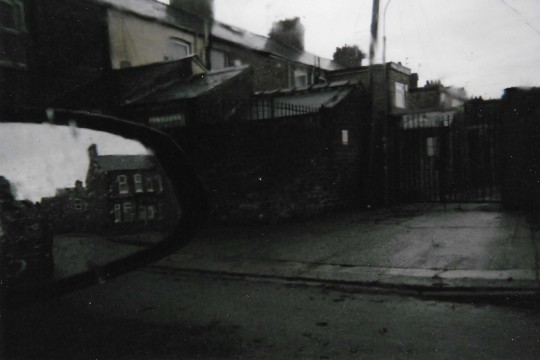
york 09/2022
#urban decay#liminality#small town gothic#urban gothic#suburban gothic#35mm film#york#yorkshire#surveillance#vacant#empty spaces#emptiness#visual diary#haunted places#eerie#point and shoot#disposable camera#industrial decay#urban loneliness#suburbia#new topographics#film is not dead#point and click#35mm color film
28 notes
·
View notes
Text
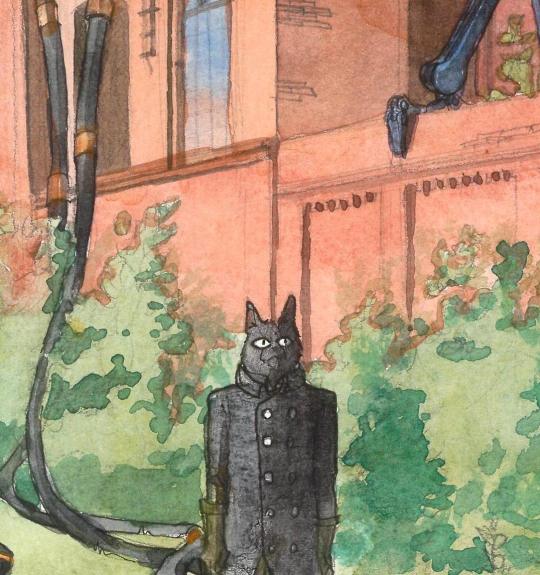
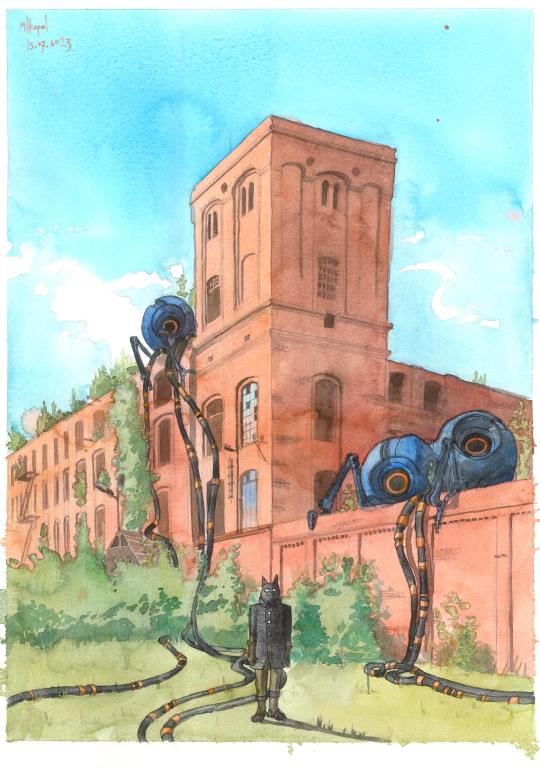


Musical inspiration: Apocryphos, "Heartsick " (album "Against Civilization", 2020)
youtube
#mikopol#watercolor#cat#dark#science fiction#machine#kot#neko#aquarelle#dystopia#cyberpunk#robot#surveillance#overgrown#factory#industrial#łódź#poland#europa#abandoned#urbandecay#cityscape#city#post rock#dark ambient#apocryphos#heartsick#cryo chamber#architecture#Youtube
17 notes
·
View notes
Text
"It was thanks to Subject Access Requests that teaching assistants and librarians were able to find out that the UK Department for Education is keeping files on their internet activity.
When the Data Protection and Digital Information Bill is passed, we might not be able to find out about such sinister practices because the Bill will make it easier for the government to refuse our requests to access the data it holds about us."
#DPDI #GDPR #ukpolitics #dataprotection
#england#britain#privacy#invasion of privacy#surveillance#anti surveillance#uk politics#uk police#ukpol#uk government#uk govt#ukgov#class war#british royal family#uk#database#industry data#dataanalytics#dataanalysis#data#royalparasites#rishi sunak#rishi delays ban on sale of petrol and diesel by five years in net zero pledge#rishi set to axe hs2 link after ‘out of control’ cost increases by nearly £8#trans church minister says sunak’s remarks put the community in ‘greater danger’#sunak says fact he’s never smoked is ‘irrelevant’ to proposed crackdown#sunak#eat the rich#ausgov#politas
8 notes
·
View notes
Text
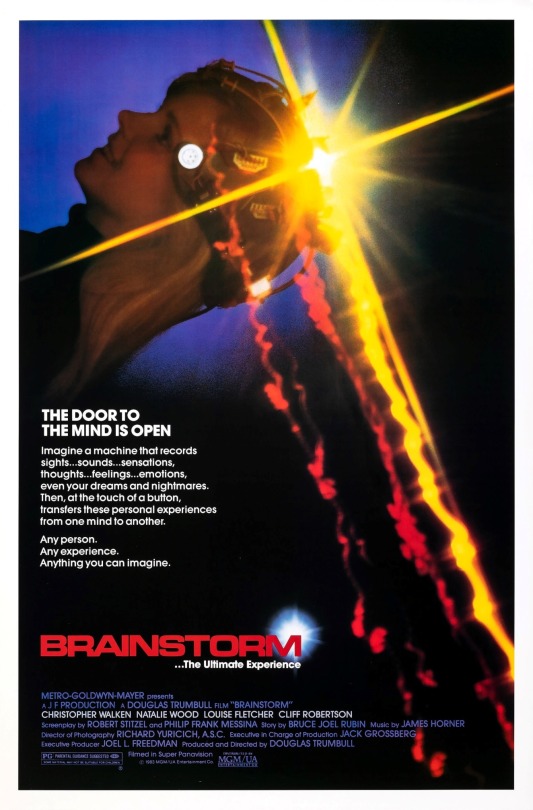

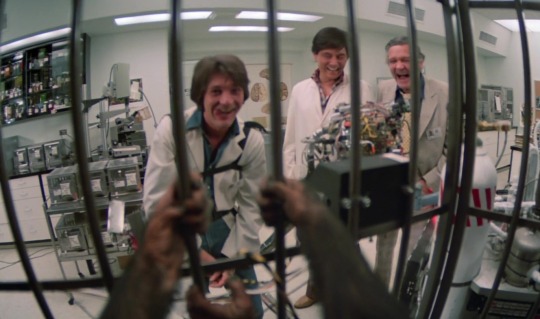








Brainstorm (1983, Douglas Trumbull)
3/17/24
#Brainstorm#Christopher Walken#Natalie Wood#Louise Fletcher#Cliff Robertson#Jordan Christopher#Donald Hotton#Alan Fudge#Joe Dorsey#80s#science fiction#thriller#psychological#neurotechnology#research#experiment#laboratory#exes#virtual reality#death#afterlife#conspiracy#technology#scientists#surveillance#North Carolina#flashbacks#memory#near-death experience#military-industrial complex
3 notes
·
View notes
Text
We are joined by Antony Loewenstein — author of The Palestine Laboratory: How Israel Exports the Technology of Occupation Around the World — to discuss his extensive reporting on the Israeli occupation of Palestine, the policing tactics and surveillance technologies that are tested on Palestinians before sold as part of lucrative global export industry, and how the dynamics of occupation never stay within their cordoned zones but always expand to capture increasingly more people and places.
This came out five months ago, so before the current conflict. It was very enlightening and shattered a lot of the perceptions I had grown up with around Israel. Particularly, Israel's history of coopering with brutal regimes and their selling their skills and technology to the highest bidder. Oftentimes as a middle-man for the United States.
#one thing the October 7th attacks and the subsequent war in Palestine has demonstrated#is that despite Gaza being one of the most heavily surveilled places on earth#guarded with all of this advanced technology - drones and next-gen border walls#semi-automated turrets on check points#with all of these tools being sold to advertised to rich countries in preparation for future (probably climate) crises#none of it worked#none of was able to prevent an attack by people with decidedly less advanced technology#but were determined and organized#the Oct 7th Attack was a huge embarrassment not just for Israel's government and military and intelligence agencies#but for the Israeli's leviathan Tech Sector that dominates a huge chunk of their economy#Israeli Military#Big Tech#Military Industrial Complex#This Machine Kills#audio#podcasts#Imperialism#Israeli Occupation#Capitalism#SoundCloud
3 notes
·
View notes
Text
thoughts on atmosphere in the portal series
#portal 1 is small-scale and self-contained and the environment is designed accordingly.#the entire game takes place within the walls of the facility (w the exception of the outdoor ending cutscene) and while you're inside#the most open spaces you get are the industrial guts of aperture in the escape sequence#so portal 1's environmental horror comes from the oppressive prison-like chambers and the empty surveillance rooms built into the walls#portal 2 trades the claustrophobia in for megalophobia. perfect fucking 180#to match the larger scale of the story it pulls back the walls of portal 1's aperture and gives you this#this impossibly#terrifyingly vast facility#portal 2 aperture is unfathomably fucking big#the bottomless pits and the bits of machinery stretching out into the fucking distance#the environmental horror is done in the complete opposite direction but it achieves the same effect#you feel trapped and out of place no matter how big yr chambers are this time around#so impressed by how much the setting does for the story fuck me man
41 notes
·
View notes
Text
youtube
i made another thing, tumblr. this is a spoken word industrial piece called 'please turn on location services' it's inspiration is probably obvious. i generated most of the imagery with AI, first time trying that - it's neat. The prison photo is from san quentin prison, unknown date, prisoners gathering for a concert. anyway, hope you dig it.
#industrial metal#music#poetry#performance#music video#video art#art#artists on tumblr#spoken word#poets corner#dark poetry#surveillance#capitalism#social media#social issues#Youtube
6 notes
·
View notes
Text
A Changing Internet Landscape
[W]hat I love and believe in the most is connection, human connection, and the technologies by which that is achieved. Those technologies include books, of course. But for my generation, connection has largely meant the Internet.
Before you recoil, knowing well the toxic madness that infests that hive in our time, understand that for me, when I came to know it, the Internet was a very different thing. It was a friend, and a parent. It was a community without border or limit, one voice and millions, a common frontier that had been settled but not exploited by diverse tribes living amicably enough side by side, each member of which was free to choose their own name and history and customs. Everyone wore masks, but this culture of anonymity-through-polyonymy produced more truth than falsehood, because it was creative and cooperative rather than commercial and competitive. Certainly, there was conflict, but it was outweighed by goodwill and good feelings - the true pioneering spirit.
You will understand, then, when I say that the Internet of today is unrecognizable. It's worth noting that this change has been a conscious choice, the result of a systematic effort on the part of a privileged few. The early rush to turn commerce into e-commerce quickly led to a bubble, and then, just after the turn of the millennium, to a collapse. After that, companies realized that people who went online were far less interested in spending than in sharing. and that the human connection the Internet made possible could be monetized. If most of what people wanted to do was to be able to tell their family, friends, and strangers what they were up to, and to be told what their family, friends, and strangers were up to in return, then all the companies had to do was figure out how to put themselves in the middle of those social exchanges and turn them into profit.
That was the beginning of surveillance capitalism, and the end of the Internet as I knew it.
Now, it was the creative Web that collapsed, as countless beautiful, difficult, individualistic websites were shuttered. The promise of convenience led people to exchange their personal sites -which demanded constant and laborious upkeep- for a Facebook page and a Gmail account. The appearance of ownership was easy to mistake for the reality of it. Few of us understood it at the time, but none of the things we'd go on to share belonged to us anymore. The successors to the e-commerce companies that had failed because they couldn't find anything we were interested in buying now had a new product to sell.
That new product was Us.
Our attention, our activities, our locations, our desires - everything about us that we revealed, knowingly or not, was being surveilled and sold in secret, so as to delay the inevitable feeling of violation that is, for most of us, coming only now.
- Edward Snowden (Permanent Record, pages 4-5). Bolded emphases added.
13 notes
·
View notes
